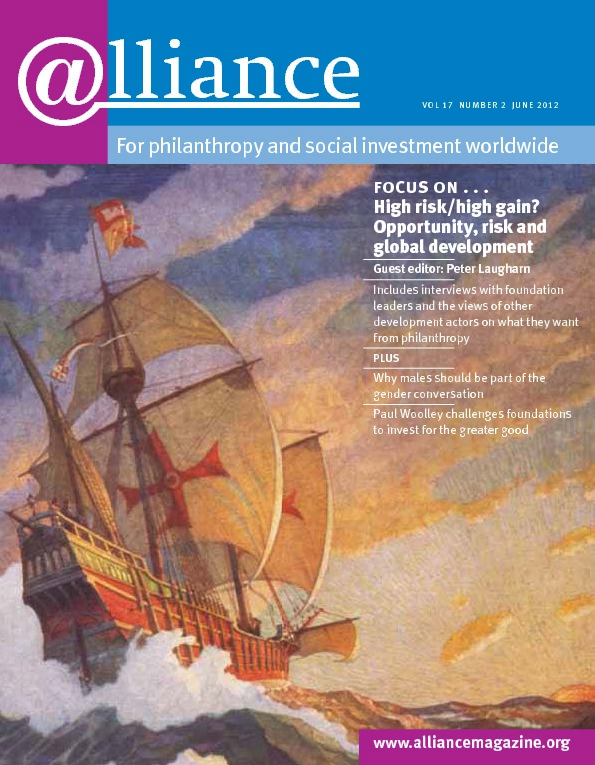Development in the 21st century will have little resemblance to its 20th-century antecedent. It must change dramatically or it won’t succeed. Why? Because it has to take into account a series of global threats that were largely absent for much of the last century. Threats like climate change, water insecurity, and new kinds of pandemic. Threats that arise outside of borders yet have impacts within them. Threats that can’t be tackled by any one government, but for which collective action has to date proved politically impossible. Development towards sustainable, resilient communities is the only real option in today’s world.
Countries that pursue traditional forms of development – energy-intensive manufacturing, often for export – will find that path untenable. Conversely, countries that adopt approaches to manage the risk of global threats can succeed. Development will increasingly depend on how effective societies are in risk management.
Foundations have a unique role to play in this changing development dynamic. Foundations can take the big picture view, looking across traditional silos (water people don’t talk to pandemics people who don’t talk to climate people who don’t talk to conflict folks) to understand the interrelated nature of today’s global threats. Foundations have been referred to as ‘society’s risk capital’. Today, the risks are greater than they’ve ever been. Indeed, taken to extremes, we now face risks that are nearly existential. Nuclear proliferation is the only such risk most would have acknowledged 20 years ago. Today, it has been joined by climate change, pandemics, food and water insecurity, and more. Yet few governments and civil society players seem to recognize the web of interrelated risk that’s being woven today. Foundations can help drive this recognition.
First, however, foundations need to break out of their traditional modes. It’s not easy. At the Skoll Global Threats Fund, we have the benefit of being new, created explicitly to tackle the global challenges outlined here. We have a founder with deep concern for these issues. We don’t have to convince board members about their importance or change our practices.
No one can solve only one or two of these global challenges; they are interrelated. They require new ways of thinking, new ways of communicating, new forms of governance, new alliances. They require new strategies of risk management, which foundations can support.
Risk management has two aspects. One is working to counter the effects of negative trends. We can, and should, try to reduce carbon emissions, prevent epidemics from becoming pandemics, help victims of drought. But we also need to create new ways not just to treat symptoms but to eradicate underlying causes. Foundations are ideally suited for making these kinds of bets.
What do I mean? Yes, of course we need to treat victims of diseases like HIV/AIDs and pandemic flu. But wouldn’t it be better to figure out how viruses jump from animals to humans and cut them off at that stage? On climate, civil society the world over has invested heavily in an international emissions treaty, yet it seems as far away as ever. Do we need a new approach to governance itself? Foundations can help explore various options. Lessons may come from unexpected places, including other global threats. The nuclear non-proliferation field, for example, with its combination of formal international agreements and informal ‘coalitions of the willing’, may be instructive for climate.
The global challenges that will shape 21st-century development are huge and daunting. They require a combination of public consciousness, political will, infrastructure, governance and, yes, technology. All will be required to make progress on these challenges. They also require an increased appetite for risk from foundations. With the complexity and interrelated nature of these challenges, we face the added burden of often not even knowing exactly what impact we seek. That’s true with climate change, and arguably other global threats. So it requires a willingness to step into the breach, to explore options when the impact we desire isn’t crystal clear.
As the field of philanthropy has moved towards more metrics and accountability, this will strike many as counterintuitive, even heretical. But we, as a field, have to get comfortable with uncertainty as we tackle these massive challenges. I’m confident that smart, well-intentioned and coordinated action will lead us in the right direction. But no one can tell you, with precision, what that future is.
Larry Brilliant is the president of the Skoll Global Threats Fund. Email pres@skollglobalthreats.org





Comments (0)